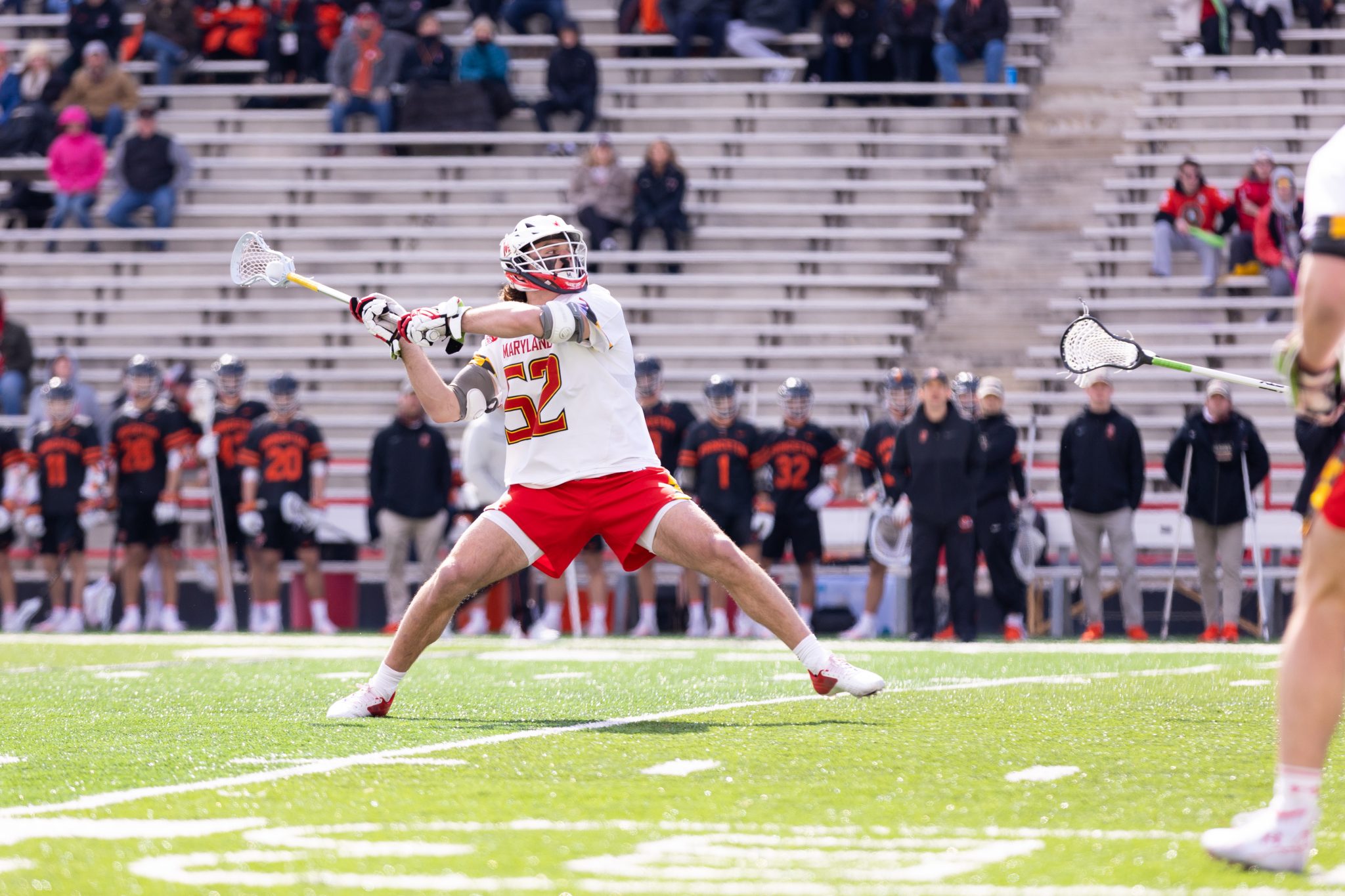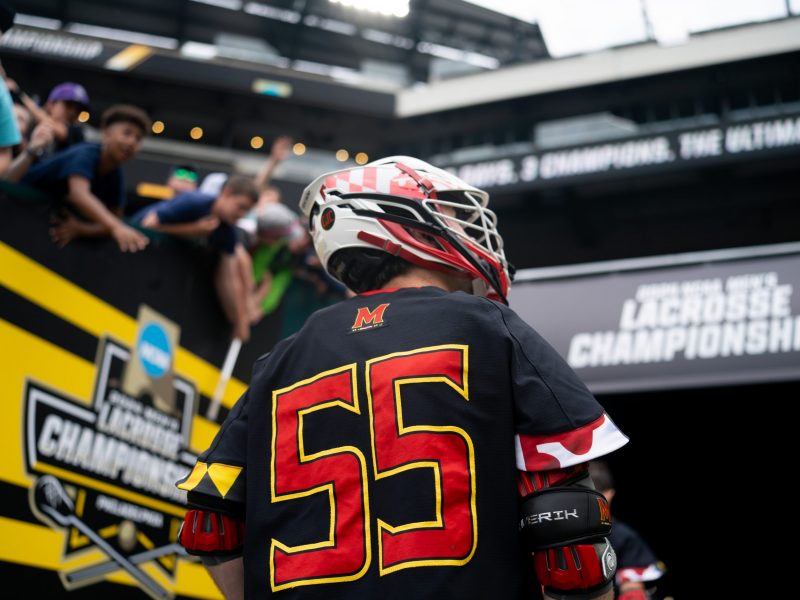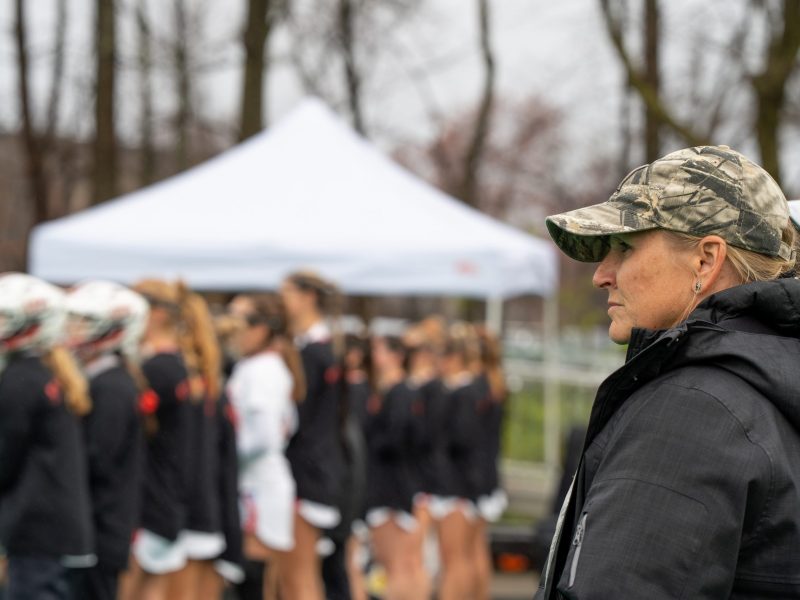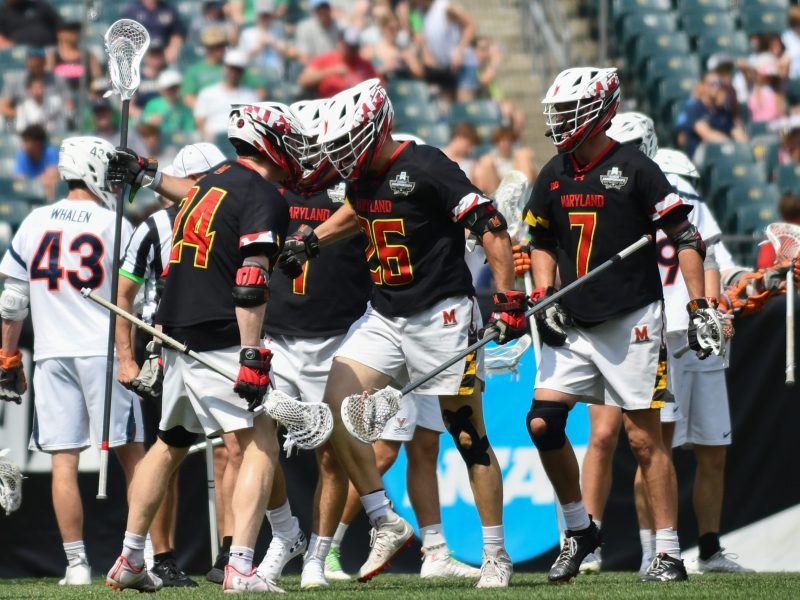Luke Wierman scooped the ball forward on a faceoff before getting tripped up. Princeton faceoff specialist Jack-Henry Vara was called for a violation and ran off of the field to make a substitution.
Wierman stayed on.
The junior charged into the open space Vara left behind, allowing Maryland to essentially play with a man advantage.
He tossed a quick pass to Roman Puglise who returned it. The faceoff specialist wound up from 15 yards out and unleashed a shot that found the top corner to double the Terps’ early lead against the Tigers.
While most faceoff specialists solely focus on the battle at the faceoff X, Wierman’s ability to remain on the field in offensive and defensive situations gives Maryland men’s lacrosse an edge over its opponents.
“We can keep him in on clears, if there’s pressure on faceoffs we’ll just throw it back to him, so it is a great asset,” coach John Tillman said. “Obviously he’s pushing the ball and scoring goals and throwing it to guys. He’s really good in the pick game for us but also, if guys try to dodge him … Luke’s a good athlete, so he has an idea of how to defend those picks.”
Wierman’s skill set alleviates the Terps of the need to substitute a faceoff specialist off in transition and allows them to take advantage of teams that do by playing with a man-advantage. His attacking prowess has helped the junior notch eight goals and three assists so far this season.
He’s also broken out at the X and won faceoffs at a historic rate.
In his first season as the team’s main faceoff specialist, Wierman broke Maryland’s record for single-season faceoff wins during the Terps’ Big Ten tournament championship win. He also notched the second highest faceoff winning percentage in the nation this year at 65.4 percent.
The junior has become one of Maryland’s most important players because of his ability to win possessions and stay on the field, something he learned by playing many positions throughout his lacrosse career.
Wierman feels remaining a part of play after a faceoff is essential for today’s faceoff specialists.
“I’d say the most important thing right now as a faceoff guy is just being able to kind of stay on the field and not just concede,” Wierman said. “I think that was a lot different from when the faceoffs were different a few years ago.”
The difference stems from a 2020 rule change that disallowed faceoff specialists from starting with a knee on the ground. Now, only their feet, gloves and sticks can touch the field.
Because of this, faceoff specialists are less likely to clamp the ball and more likely to win a faceoff in a fluid motion, requiring them to immediately enter play — that gives Wierman an advantage.
“With these new rule changes, it forces faceoff guys to become better lacrosse players,” said John Bodnar, one of Wierman’s faceoff coaches and mentors. “There’s … a lot more opportunities where you have to pick up ground balls in tough places and carry the ball a lot more with these new faceoff rules, and it all fits perfectly into his abilities.”
Bodnar believes the combination of Wierman and the clinical attackers at Maryland’s disposal has allowed both the faceoff specialist and the Terps to thrive this season.
“With a powerful offense like Maryland, it’s like having a cheat code,” Bodnar said of Wierman. “Especially a guy who can generate offense and make plays … after that whistle blows. [Wierman’s] a major part of their success this year.”
[Maryland men’s lacrosse earns No. 1 overall seed in NCAA tournament]
Wierman played as a midfielder growing up and had some experience facing off at the youth level where teams normally don’t have a designated faceoff specialist.
However, when he got to eighth grade and realized his future high school team didn’t have a specialist, he began to focus on the role in a bid to make the varsity team in his freshman year.
“I thought it was just a way to get me on varsity and get me in front of those coaches’ eyes,” Wierman said.
He trained with former NEC first team faceoff specialist Mike Lanham — who played at Saint Joseph’s and was his coach at Rough Riders lacrosse club — and worked with Bodnar and other coaches at the Philly Faceoff League, who exclusively train faceoff specialists.
Wierman’s coaches knew he was raw and behind others at his age, but they also knew he had the right temperament to improve.
“You could see, even at a young age, that he had a strong work ethic,” Bodnar said. “He was always asking questions, always trying to work on new stuff. And he was an athlete. He was a total athlete.”
That commitment quickly paid off, as Wierman made varsity after impressing coaches at a scrimmage by winning a string of faceoffs before his freshman season began.
Wierman’s continued development at the faceoff X didn’t stop him from playing other positions throughout his high school career. He operated as a midfielder at B. Reed Henderson high school and earned All-American honors at the position in 2019.
“The part that I loved about Luke the most was really the fact that after the faceoff, I felt confident with him in every aspect of the game,” Lanham said. “Whether that was offense, as a middy, or on defense when the ball went the other way. He was just a dominant force.”
Wierman initially committed to Fairfield during his sophomore year of high school but got a release from his letter of intent after former Stags coach Andrew Copelan stepped down.
That left the high school All-American uncommitted in the spring of his senior year, opening the door for Tillman and Maryland to step in.
It started with an email.
“I was starstruck,” Wierman said. “I was like, I need to do everything I can to try to talk to them and get in front of their eyes and try to visit or whatever they want me to do.”
Wierman visited the university and quickly committed to the Terps the day before his high school graduation party.
In his COVID-shortened freshman season, Wierman went from never leaving the field in high school to not touching it.
The faceoff specialist had to adjust to focusing on one position and the pace of college play in his first year.
“At first, the main focus was really just getting used to the speed of everything,” Wierman said. “When I got [to Maryland], it was a big leap for me.”
[Anthony DeMaio’s refined shooting spurred Maryland men’s lacrosse to Big Ten tournament win]
After the summer of 2020, when Tillman said Wierman committed himself to improving, the Terps made the surprise choice to select him as the second faceoff specialist with senior Justin Shockey.
“We were kind of searching for a second guy, and we thought it’d be Conor Calderone, but it ended up being Luke,” Tillman said. “You can see him at times doing really well, and there were certain matchups where Justin just did not do well.”
Shockey had a decent season on the whole — winning 51.2 percent of his faceoffs — but struggled in certain matchups. The senior won five or less faceoffs in six of Maryland’s games in 2021, two of which came in the national tournament.
Wierman was a solid replacement when Shockey stumbled and even grabbed a couple of starts. He won 45.3 percent of his faceoffs throughout the season and stepped up against Notre Dame in the national quarterfinals and Virginia in the national championship.
Despite struggling at the X against the Fighting Irish, Wierman showcased his offensive and defensive skills in a matter of seconds with a big play in the fourth quarter.
He lost a faceoff, but chased down Notre Dame’s Kyle Gallagher and scythed the ball out of his stick as he fell to the ground.
Wierman then got up and sprinted forward as Maryland moved the ball in transition, receiving a pass from Jared Bernhardt and bursting into the attacking half of the field.
The faceoff specialist faked a look out wide before finding Daniel Maltz right in front of the net, who scored to tie the game at 12 with less than 10 minutes to go. The Terps went on to defeat the Fighting Irish in overtime and coasted past Duke in the national semifinals to reach the NCAA championship.
Wierman was thrown into the fire against Virginia’s Petey LaSalla — who won the most faceoffs in the country in 2021 — after Shockey got off to another poor start.
He held his own against one of the nation’s best, winning 14 of 30 faceoffs against LaSalla. Tillman’s squad engineered a comeback late, and scored with just 11 seconds left to cut the Cavaliers’ lead to one.
Wierman knocked the ball forward on the ensuing faceoff and raced toward the net past sliding defenders, running against the ticking clock.
His low shot was parried away by the goalkeeper, and he was knocked to the ground as time expired and Virginia rushed the field in jubilation.
He laid on the turf for minutes as the Cavaliers lifted the trophy before being consoled by Tillman as he eventually walked off.
“I definitely think [the miss] motivates me all the time,” Wierman said. “I think just the whole season last year in general and what our team sacrificed together and just how it ended, I think that motivates our whole team.”
[Maryland men’s lacrosse dominates Rutgers, wins Big Ten tournament title, 17-7]
Wierman has taken the reins of the position this year, taking 81.7 percent of Maryland’s faceoffs despite the addition of Virginia transfer Gavin Tygh.
Motivation from last year’s national championship loss alongside last fall’s addition of new volunteer assistant coach Carroll Kennedy have both helped Wierman’s faceoff winning percentage spike up 20 points to 65.4 percent.
“[Kennedy] helps with your technique, and he’s just really hands on with everything,” Wierman said. “We just built a really good relationship really quickly, and I feel like that’s a huge part of it. We trust each other.”
The junior boasts the second highest faceoff winning percentage in the nation while working with the coach this year, consistently winning the faceoff battle.
“I think Coach Kennedy’s been doing a great job breaking down film with us and just showing us what other teams’ tendencies are,” Wierman said. “I think that’s been a huge reason for why we’ve had the success that we’ve had.”
That preparation has paid off for the Terps, as Wierman has only dipped under 50 percent in two games this season. He lost the faceoff battle by one to Syracuse and two to Johns Hopkins, still winning faceoffs at a 48.1 percent and 45.5 percent clip, respectively.
His two worst performances of the year are still better than the 45.3 percent he won on average last season.
Even after his season low performance against the Blue Jays, Wierman responded with a dominant performance over Rutgers in the Big Ten championship. He went 20-for-26 at the X and set Maryland’s single-season record for faceoffs won, which now sits at 236.
“[Wierman] was displeased and he was super motivated [after the Johns Hopkins game],” Tillman said. “He wanted to come out and respond, and respond well. There is no feeling sorry for himself.”
Wierman has added eight goals and three assists, as his success at the X and in front of the net has been acknowledged throughout the season.
He was named Big Ten Specialist of the Year and selected to the All-Big Ten First Team following the conclusion of the regular season. The faceoff specialist has also been named a Tewaaraton Award nominee, an honor only 25 players receive.
The faceoff specialist’s threat on offense has also helped the Terps to their highest scoring season in program history. They’ve scored 257 goals in 14 games, surpassing last season’s total of 255.
“It’s not very common [to see faceoff specialists stay on the field], and because of that, people have to game plan around him being out there,” Kennedy said. “That kind of helps create some more space for our offensive guys because you have to honor him out there.”
Wierman’s abilities at the faceoff X and elsewhere on the field have helped propel the undefeated Terps to a Big Ten regular season and tournament championship.
His rare ability to contribute during the flow of play as well as his excellence as a faceoff specialist could help push Tillman’s squad over the line as Maryland prepares for another national tournament trek.
“He has that stay on first mentality,” Bodnar said. “A lot of these [faceoff specialists], the minute they get rid of the ball they want to run off the field. But Luke, he’s looking to stay on and make a play.”



